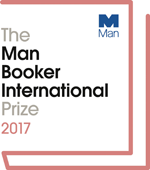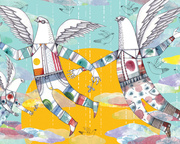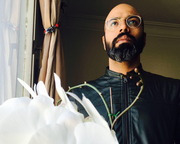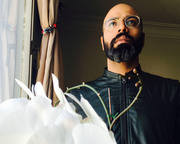More articles Saturday 12 August 2017 7:00am
Director's Cut: Nick Barley's International View - Saturday 12 August
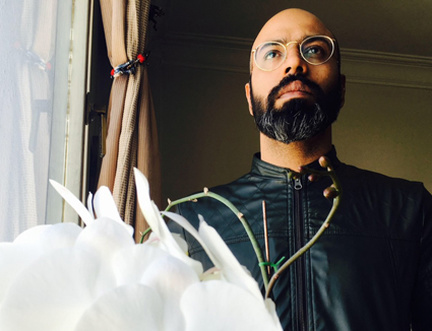
Earlier this year, Book Festival Director Nick Barley chaired the judging panel for the 2017 Man Booker International Prize – a prize awarded annually for the finest piece of fiction in translation, and shared equally by the author and translator. In a series of blog posts running throughout the Festival, he gives you an insight into what went into selecting this year’s winner and highlights some of the top international authors appearing at the Book Festival this year:
Ehsan Abdollahi and the need for international dialogue
Every festival has setbacks during the course of a programming year, and literary festivals are perhaps more prone to problems than others. That’s because if your author goes AWOL for any reason, there’s no scope for hiring a stand-in. When you’re running a festival with 1,000 participants, the chances are you’re going to have one or two writers who – with the best will in the world – have to drop out and cancel their event. We’re careful never to give out personal reasons for an author’s cancellation, but they are almost always legitimate problems or health issues that could not have been foreseen. That’s the case for translator Jessica Cohen, who was exceptionally keen to join us in Edinburgh to discuss her Man Booker International Prize-winning work on David Grossman’s novel. Sadly, we just couldn’t overcome the logistical hurdles.
Alongside these personal problems, each year we also have a handful of international authors who fail to secure a visa to travel to Britain. It’s a problem that looks set to increase in this new era of travel bans and ‘taking back control’ of our borders. Even before Britain’s referendum vote to leave the EU, we were finding that an increasing number of authors were failing to pass the necessary tests and checks. I was usually willing to chalk it up to bad luck, and in all honesty there are some authors whose track record as activists or political prisoners made me nervous about championing their case too loudly, for fear of putting them at greater risk in their home territory.
A fortnight ago, a case came up that I simply couldn’t let go. The Iranian illustrator Ehsan Abdollahi had travelled from Tehran to Dubai in order to secure his visa to visit us. The UK visa people had declined his application on the grounds that he had a small amount of money in his bank account and he hadn’t provided sufficient evidence of how he’d managed to save it up, given his job as a university lecturer. This was baffling, because I’ve heard of other applicants whose visas have been refused on the grounds that they don’t have enough money in their account! To make matters worse, Ehsan’s status as a divorced man was given as further grounds for rejecting the visa. There was no clear family reason for him wanting to return to Iran after his visit, or so the visa people suggested.
I was livid. This was a children’s illustrator, the co-creator of a book about happiness for goodness sake. And it was the third consecutive year we’d had an Iranian children’s author refused entry. Along with my colleague Janet Smyth, and Ehsan’s tireless publisher at Tiny Owl, Delaram Ghanimifard, we noisily began a campaign to get the decision overturned. To their enormous credit, The Bookseller ran a big piece on the story, and the Guardian soon picked it up too. Our furious Twitter campaign began to be retweeted at an astonishing rate. Then politicians started getting involved: representatives from the Scottish Government began to make discreet noises behind the scenes in London, and the Edinburgh MP Deidre Brock went public too. A few days later I had a positive response from Nicholas Hopton, the UK’s ambassador in Iran, and within hours the visa decision had been overturned.
We’d had success on this occasion, though I know that many other festivals are not so fortunate. I hope that Ehsan Abdollahi’s case stands as a beacon for others: a small demonstration that non-violent public protest can actually change a government’s behaviour in a democracy.
The wider points are all too obvious – and worrying. If the government is operating a de facto travel ban from certain countries, they should admit it. And if the government is going to include artists and authors in such bans, they will be denying us crucial opportunities to share international dialogue and understanding. That’s just not acceptable in an open country like the United Kingdom – and certainly not in Scotland. Whatever the new border restrictions in a post-Brexit era and whatever the political hue of the government, the Book Festival will fight for freedom of movement for authors and for artists of all kinds. There is no alternative.
Ehsan Abdollahi discusses the importance of international artistic dialogue with Delaram Ghanimifard and others on Tuesday 15 August at 4.30pm. Tickets for the event are available online, by calling the Box Office on 0845 373 5888 or by visiting the Book Festival Box Office in the Charlotte Square Gardens Entrance Tent.
Edinburgh International Book Festival - bringing you the finest in translated fiction in association with The Man Booker International Prize.
Look, Listen & Read
- 2026 Festival:
- 15-30 August
Latest News
 Major new partnership with Celtic Connections
Major new partnership with Celtic Connections

